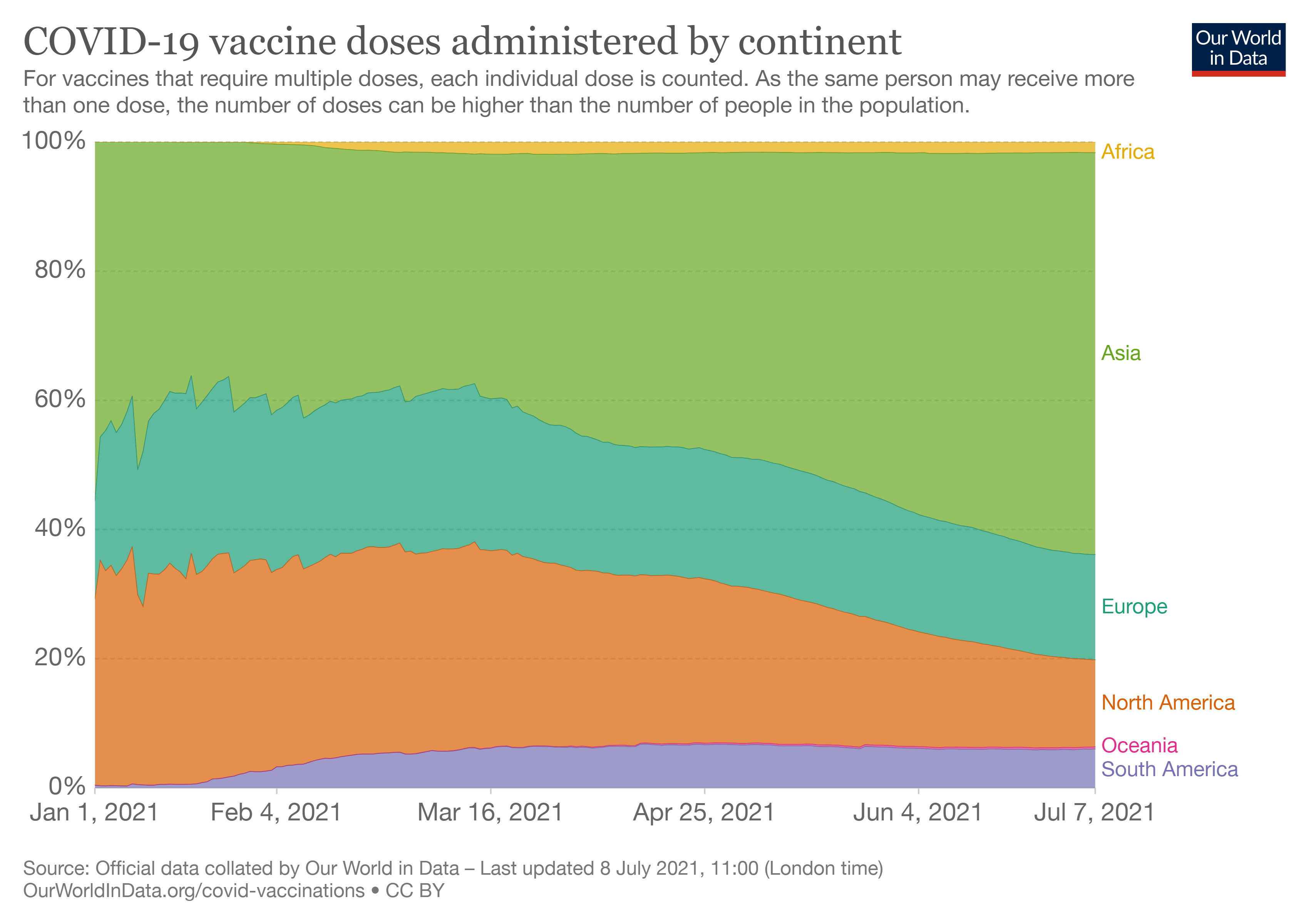COVID-19: What you need to know about the coronavirus pandemic on 9 July
Vaccine programmes continue across the world.
Image: REUTERS/Luc Gnago
Explore and monitor how COVID-19 is affecting economies, industries and global issues
Stay up to date:
COVID-19
- This daily round-up brings you a selection of the latest news and updates on the COVID-19 coronavirus pandemic, as well as tips and tools to help you stay informed and protected.
- Top stories: US cases on the rise; no spectators for Olympic Games; COVAX pledges 520 million vaccines to Africa this year.
Have you read?
1. How COVID-19 is affecting the globe
Confirmed cases of COVID-19 have passed 185.5 million globally, according to Johns Hopkins University. The number of confirmed deaths stands at more than 4.01 million. More than 3.32 billion vaccination doses have been administered globally, according to Our World in Data.
The United States has administered more than 332 million doses of COVID-19 vaccines in the country as of Thursday morning and distributed more 385 million doses, the US Centers for Disease Control and Prevention said.
Australian authorities have urged Sydney's residents to stay home, warning a three-week lockdown may be extended as they try to control a COVID-19 outbreak.
From Monday South Korea will tighten coronavirus curbs to their strictest level possible in Seoul and neighbouring regions, over concerns over rising COVID-19 cases.
US COVID-19 cases are up around 11% over the previous week, almost entirely among people who have not been vaccinated, officials said on Thursday, as the highly infectious Delta variant becomes the dominant COVID-19 strain in the country.
Britain plans to scrap quarantine for fully-vaccinated arrivals from other countries in the coming weeks, transport minister Grant Shapps said on Friday.
Viet Nam is aiming to vaccinate 50% of residents aged 18 or older by the end of this year and 70% by the end of March 2022, the health ministry said on Friday. It comes as tighter coronavirus curbs were imposed in more cities.
On Thursday, Indonesia reported a new daily record of 38,391 COVID-19 infections, plus 852 new fatalities, its second-highest daily death toll, official data showed.
2. Africa surpasses second wave peak as vaccine rollout picks up
Africa has seen its worst pandemic week ever, as it passed the second-wave peak during the seven days ending on 4 July 2021. More than 251,000 new COVID-19 cases recorded on the continent.
Sixteen African countries are now in resurgence - with Malawi and Senegal added this week. The Delta variant has been detected in 10 of these countries.
“Africa has just marked the continent’s most dire pandemic week ever. But the worst is yet to come as the fast-moving third wave continues to gain speed and new ground,” said Dr. Matshidiso Moeti, World Health Organization (WHO) Regional Director for Africa.
The global vaccine distribution scheme COVAX aims to deliver 520 million COVID-19 vaccine doses to Africa this year, its managing director said, with supplies ramping up from September after delays caused by Indian export restrictions.
In a news conference on Thursday organized by the World Health Organization's Africa region, Aurelia Nguyen, managing director of COVAX, said that the scheme had delivered around 25 million doses to 44 African countries so far, but she was not happy with the progress.
By the end of the first quarter of 2022, COVAX aims to supply nearly 850 million vaccine doses to the African continent, which has some of the lowest COVID-19 vaccination rates worldwide.
How is the World Economic Forum helping to identify new technologies to fight COVID-19?
3. Tokyo bans Olympic spectators as state of emergency declared
The Olympics will take place without spectators in host city Tokyo, organisers said on Thursday, as a resurgent coronavirus forced Japan to declare a state of emergency in the capital that will run throughout the Games.
Prime Minister Yoshihide Suga said it was essential to prevent Tokyo, where the highly contagious Delta variant of COVID-19 variant was spreading, from becoming a flashpoint of new infections.
People will also be asked not to gather for events on public roads, such as the triathlon, though officials said some venues outside the greater Tokyo metropolitan area would allow small numbers of spectators.
"It is regrettable that we are delivering the Games in a very limited format, facing the spread of coronavirus infections," Tokyo 2020 President Seiko Hashimoto said, following talks between government officials, Tokyo organisers and Olympic and Paralympic representatives.
Accept our marketing cookies to access this content.
These cookies are currently disabled in your browser.
Don't miss any update on this topic
Create a free account and access your personalized content collection with our latest publications and analyses.
License and Republishing
World Economic Forum articles may be republished in accordance with the Creative Commons Attribution-NonCommercial-NoDerivatives 4.0 International Public License, and in accordance with our Terms of Use.
The views expressed in this article are those of the author alone and not the World Economic Forum.
Forum Stories newsletter
Bringing you weekly curated insights and analysis on the global issues that matter.
More on Health and Healthcare SystemsSee all
Shyam Bishen
May 13, 2025
Ti Hwei How
May 7, 2025
Gaurav Ghewade
May 6, 2025
Camilla Macapili Languille
May 5, 2025




